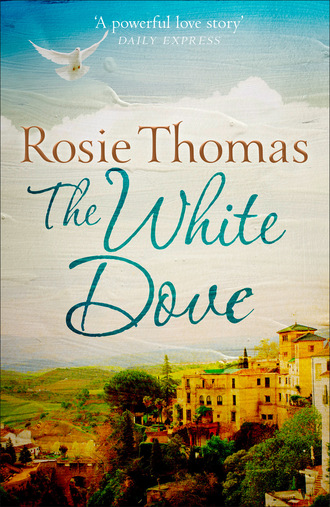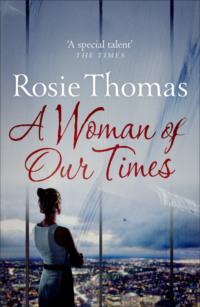
Полная версия
The White Dove
‘For many people, you know, it would be more than enough. It would be Paradise.’
Amy’s face went a dull crimson. ‘I know,’ she said humbly. ‘Does that condemn me completely?’
‘No, it doesn’t. Let’s try to think. What could you do?’
‘Richard says that your office was full of girls doing things. I can speak French and German and a little Spanish. I can paint a bit, and a few other useless things. Could I be a secretary? Could I be your secretary?’
Tony tried not to let his smile broaden. ‘I don’t think so. Most secretaries have to be able to type and take shorthand, you know.’
‘I could learn.’
‘Yes. Look, there must be other girls of your class in your position. They must do things to which there could be no possible parental or social opposition. Can’t you think of any?’
‘There’s Welfare work. Charity organizing. That sort of thing.’
‘Wouldn’t that do?’
Amy’s disappointment showed. ‘It means sitting on committees for charity balls, and bazaars. Raising money. Addressing envelopes for appeals. I would have liked an ordinary job, perhaps something that might help people. Whatever they’re doing out there.’ She gestured over the heads of the crowd and beyond the walls with their white silk drapes.
Tony’s eyebrows worked themselves into triangular peaks. ‘Out there? In Bruton Street?’
‘No, damn it. Not Bruton Street.’
‘Amy, how much do you really know about ordinary people and the work they do?’
‘Nothing. I’m asking you to help me find out. Look, you took Richard somewhere last night. Would you take me out sometimes, too? I’d like to meet some people who aren’t anything like these. There isn’t anyone else I can ask. If I mentioned it to Johnny Guild, he’d say, “Oh, I say, Amy, what for? I hate slumming.” If I could broaden my horizons a little, it might help me to know a little bit better what I’d like to do. Is that reasonable?’
Tony sighed. ‘My dear. Downstairs you have the entire British aristocracy. If someone dropped a bomb now we’d have an instant socialist state. Up here is the cream of London’s fashionable intelligentsia. One notorious poet there. Two well-known actresses there, ignoring each other. A beautiful divorcee here with very high connections. What do you imagine you are going to gain by hanging around the Fitzroy Tavern with me? Or making little expeditions to gape at conditions in the East End. Or whatever romantic idea it is you’ve got in your head?’
Amy looked down at her glass. ‘These are Mother’s friends. The people downstairs are here because Father is who he is. The King’s Defender, and all that. I want a life of my own, Tony. A useful, ordinary life with the rewards of satisfaction.’ She was crying again. A tear fell and rolled over her knuckles.
Tony Hardy’s amused impatience evaporated. He thought that Amy had all the naïveté of her age and class, but without the cushioning of complacency. Her sincerity and her unhappiness were clear, and his heart went out to her.
‘Poor Amy. Here, handkerchief. Of course I’ll take you out and introduce you to some new people, if that’s what you would like. Don’t cry any more. Let’s fling ourselves into the throes of this party. There are dozens of people here I wouldn’t get a chance of seeing otherwise. If I arm myself with you, they can hardly cut me dead. Here’s some more champagne, to begin with. And in a week or two, if you would really like to come, we’ll go to a meeting organized by a friend of mine. It’s a political meeting, and it might interest you. Or more likely it’ll bore you to death. But there’s usually a kind of party afterwards, and people are certainly different. Different in the sense that they’re like one or two of the people in this room before they became fashionable or successful enough to be invited here by your mother.’
Amy missed the touch of irony in his voice, or else she chose not to hear it. Her face was alight. She dabbed the tears away with Tony’s handkerchief.
‘Thank you. I’d like that very much. Now, let’s fling ourselves, if that’s what you want to do. Is it the poet you’d like to talk to first? Colum O’Connor comes to Chance for Mother’s house parties sometimes. He used to like me to go for walks with him.’
‘I’m sure he did,’ Tony said drily. ‘Yes, please. Do introduce me.’
Amy went across and touched the poet on the arm. He beamed at her.
‘Well now, little Amy Lovell. Perfectly grown-up.’
‘Hello, Mr O’Connor. How are you? Do you know my friend Tony Hardy?’
Together, they worked their way around the room, greeting and talking. The faces Amy didn’t recognize, Tony did. Between conversations, Tony whispered quick, scurrilous histories to her. Amy was distinctly impressed, and intrigued. He seemed to have a far-reaching knowledge of the more colourful sides of London literary and political life.
After an hour, when they had reached their alcove again, Tony winked at her. ‘Thank you. That was useful. Now, d’you think we’ve earned some supper?’
On the way downstairs Amy asked him, ‘What do you do at Randle & Cates, exactly? Apart from gossip?’
Tony looked sideways at her, appraisingly, and then grinned. ‘Quite right, I do like gossip. I tell myself that it’s part of the job, listening to who thinks what and who’s doing what. I publish books, as you know. Which books I choose, or more often which books I nose out and coax people into doing, depends partly on what I hear, partly on what I believe in, and wholly on what will sell.’
‘Which is?’
‘Some poetry. No Eliots or Sitwells yet, but I’m working on it. Some politics. Not Peter Jaspert’s sort, I’m afraid. And some novels.’
‘What did my brother come to see you about yesterday?’
They came into the supper room. At the far end, at an empty table, was Richard. There was a champagne bottle beside him. His chin was propped on one hand and he was smiling a faint, remote smile.
They paused for a moment. Then Tony said smoothly, ‘He came to me with a proposition. Or rather more than that, a partly completed novel. I told him that he was too young even to think about it, let alone to carry it off properly. I also told him I would be interested to talk about it again in five years’ time. More than that, I don’t think I should say.’
Amy looked across the room at her brother. He waved, exaggeratedly.
‘I didn’t know Richard was writing a novel.’
‘I don’t think it’s the kind of book you would describe to your sister,’ Tony said, inaudibly.
‘Shall we go and join him?’
‘You found each other,’ Richard greeted them. ‘Nobody has found me, as you can see. I have consoled myself with champagne, and with imagining edifices of elaborate insults to every dowager who has strutted past the table. Sit down and keep me company.’
‘Are you drunk?’
‘A little. Just a very little.’
Tony brought them plates of cold lobster and quivering aspic, and the first tender asparagus tips from Chance.
‘Tony is going to take me to a political meeting in a couple of weeks, and to the party afterwards,’ Amy remarked conversationally as they ate.
Richard glanced sharply from one to the other, and then his eyelids drooped again.
‘Is he? How nice. And how nice that you have suddenly developed a political awareness, Amy. I’m sure you’ll fit in amongst the comrades with glove-like ease.’ There was a small, awkward silence. Richard smiled innocently. ‘What have I said? Well now, have we enjoyed the wedding? The tyrants have put on a creditable show, I must say. Look at it all.’ He waved at the long table with chefs in tall white toques behind it, the supper tables crowded with guests, and the endless procession of couples between supper and the ballroom where the music was growing steadily more insistent. ‘Your turn next, Amy, as they say. Have you danced with a dozen officers?’
‘Not one, this evening,’ she answered, determined not to let Richard prickle her in front of Tony. She had seen him in this mood once or twice before. ‘I was hoping Tony might ask me.’
Richard snorted over his glass. ‘Tony doesn’t dance. At least, only in louche clubs where you would be very unlikely to encounter him. There’s a much more likely candidate on his way over here. I’m sure he’ll foxtrot you off your feet.’
Amy looked. Johnny Guild was bustling across the room. He was a captain in a very smart regiment, the same one that Peter Jaspert had once belonged to. Johnny Guild had been part of the guard of honour at St Margaret’s. He was in dress uniform tonight, very tight black trousers with a broad cherry-red stripe down the sides, and a cherry-coloured coat frogged with gold.
‘He looks,’ Richard murmured, ‘as if he’s just walked out of an operetta. D’you think he’s going to sing something in a light but agreeable tenor?’
Amy bit the corners of her mouth, hard. Johnny Guild was the most persistent and most harmless of her admirers.
‘Here you are. I’ve searched high and low. Amy, I was hoping you might have a dance or two left for me. ‘Evening, Lovell.’
Amy looked at Richard and Tony in the hope of rescue, but they stood up politely, clearly expecting her to go. She let Johnny take her arm.
‘I’ll telephone you in a few days, if I may,’ Tony said, ‘about that arrangement we made.’
Johnny led her away to the ballroom.
It seemed to be full of pink faces looming over white ties, tulle skirts that were beginning to droop along with the corsages, and the determined bray of voices against the dance music. Johnny took her in his arms. His hand against her bare skin felt moist and warm.
It was all depressingly familiar.
‘Who was that with your brother?’
Amy considered the possible responses, but in the end she simply said, ‘He used to be my brother’s tutor, years ago.’
‘Oh. Well.’ Nobody at all, she silently supplied for him.
When at last Johnny led her back to the supper room, the far table was empty. Tony and Richard were gone.
In the bathroom of the odd, florid hotel between London and the South Coast that Peter had chosen for their first night together, Isabel wrapped the heavy satin robe around her and tied it carefully. She had brushed her hair until it crackled, dabbed herself with scent, and hung her honey-coloured suit up herself in the fake Empire cupboard. Her maid would rejoin them at Dover tomorrow, before they sailed.
Peter was waiting for her. She had heard the creak of his heavy tread as he moved around the bedroom, but now there was silence.
She breathed in slowly and deeply, trying to ease the hammering of her heart, and walked through into the bedroom.
Peter was already in the wide bed. He had drunk a bottle of wine over their late dinner, and two brandies afterwards. His face looked red against the pillows.
‘I thought you were never going to come,’ he whispered. He held up the covers, beckoning her in beside him. Isabel hesitated. She couldn’t get into bed in her robe, but was he expecting her to take it off?
‘Shall I turn out the lights?’ she asked.
‘No. I want to look at you.’ Peter’s voice was hoarse.
Obediently Isabel unwrapped the robe again, slipped it off and laid it across the foot of the bed. Her silk nightdress, made for her in exactly the same shade, was cut on the bias so it clung to her, with a translucent lace inset from the mock-demure high neck to the top of her breasts. Peter didn’t even glance at it. ‘Come here,’ he said. ‘Get into bed.’
Isabel did as she was told, sliding under the covers and then lying still, trying to make her stiff body relax. Peter’s large hands reached out and moved over her, groping for an opening in the folds of silk.
‘Take this thing off,’ he begged. Isabel sat up again and reached up to undo the tiny pearl buttons. She lifted the nightdress off over her head. Peter groaned, a long Uhhhhn sound that frightened her, making her think that he was ill. But he slid across the bed to her, and put his mouth on her breast. He began biting and gnawing at it, the blond stubble on his chin tearing at her skin. Isabel drew in her breath sharply with shock and disgust, and Peter lifted his head.
‘Like that, do you? That’s good.’
He pushed her backwards so that she was lying flat, and then hung over her. He was naked, and the heat of his heavy, hairy body shocked her again. Peter kissed her, rubbing all over her lips with his mouth and tongue, making little grunting noises under his breath. Isabel’s mouth felt frozen, with a choking sensation at the back of her throat as if she might vomit. This was nothing like the times Peter had kissed her before, gently, so that she had wanted to kiss him back and answer his tongue with her own. He had even touched her breasts before, reverently, with the tips of his fingers. Now he was kneading her as if she belonged to him.
You do belong to him, a cold voice reminded her. You are this man’s lawful wedded wife.
This bristly, panting creature with a sweating, screwed-up face was her handsome, confident husband.
Now Peter moved his hand down between her legs, parting them with his fist. His fingers probed at her, and then he groaned again.
‘Sorry. Can’t hold on,’ he whispered. His breath burned her ear. He heaved himself on top of her. Something bumped and then stabbed, bluntly. Isabel clenched her teeth to stop herself screaming. There was a jolt of pain and then her husband buried himself inside her. He began to rock up and down, tearing at her inside, and moaning in his throat. Isabel tried not to listen or to feel. She tried to retreat into some cold, white, locked place inside her head.
‘Oh God!’ Peter shouted, and then came a roar, so pain-filled that her arms tightened protectively around him. He jerked involuntarily, his face distorted and drops of his sweat falling on her face.
At last the jerking stopped and his full weight sank on top of her, the roar dropping away into a sob.
Isabel stroked his damp shoulders, staring up past him at the curlicued wallpaper on the ceiling. If it wasn’t so horrible, she thought, it would be funny. It was so absurd. And it was pathetic, and hardly human.
Peter slid away, leaving his hot stickiness all over her.
‘Was it all right?’ he whispered, like a child asking for a sweet.
‘Not very,’ Isabel said, longing for him to comfort her.
‘I’m sorry.’ He sounded huffy. ‘I was too excited, and I’d had a bit too much to drink You’ll like it better in the morning.’ He kissed her cheek. ‘Good night, darling. I love you.’
Isabel lay very still, listening to his breathing deepening into snores. When he was properly, deeply asleep, she promised herself, she would get up and wash.
At least it was quick, she consoled herself as she waited. At least it was quick.
FIVE
Appleyard Street, just off Bloomsbury Square. That was where Tony Hardy had said they were going. Amy peered out of the grimy window of the bus as they rumbled past Selfridges. The lit-up windows were full of spring fashions, print frocks and little straw hats, although the daffodils were barely out in Hyde Park and a week’s icy rain and high winds had already flattened them to the grass.
Outside the front doors in Bruton Street, Amy had stood poised on the steps, automatically expecting Tony to wave to a cab. But he had taken her arm and steered her briskly towards Park Lane.
‘Only a twopenny bus ride to Appleyard Street,’ he said.
‘Yes, of course.’
Amy could almost count the number of times she had been on a bus before. Past Selfridges she turned to Tony. He was smoking and frowning over a sheet of typewritten paper.
‘What’s the meeting about, exactly?’
‘Oh, the usual sort of thing. Welcome to new members of the group. A paper, read by one of the old guard. This month’s is entitled “From Dialectic to Daily Practice. A Pan-European Approach”. Then a guest speaker. Tonight’s is Will Easterbrook from the Trades Union Congress Executive. He should be interesting. And then there will be a discussion of arrangements for the hunger march.’
Seeing Amy’s blank stare Tony began to laugh. ‘You did ask to come.’
‘Hunger march?’ she asked quickly. ‘What’s that?’
‘Don’t you know? This one is one of my friend Jake Silverman’s projects. You’ll meet Jake tonight. And you’ll hear plenty about the march.’
Not wanting to betray any more ignorance, Amy went back to studying the Oxford Street windows. The shops were familiar but she felt that she was travelling past them into new territory. It was if by simply stepping on to the bus she had set out in a new direction. She was looking forward to what the evening would bring, with an eagerness that she hadn’t felt for a long time.
When the bus reached High Holborn, Tony rang the bell and they jumped off together.
Amy had never penetrated into this corner of London before. She peered interestedly at the shops, mostly small grocers, and bookshops with pavement display cases emptied and locked up for the night. There was hardly anyone in the streets, and no traffic at all, but the lights behind curtained windows over the shops spoke of tiny flats full of people.
Appleyard Street was exactly like the others. Tony stopped in front of a bookshop with a smeared window crammed full of haphazardly arranged books. A violently lettered poster stuck to the glass commanded UNITE. FIGHT FOR YOUR RIGHTS. Tony rang the side door bell and then pushed the door open. The hallway and steep stairs facing them were completely bare, and lit by a single bulb with a cracked glass shade.
Tony waved her inside with an ironic flourish. ‘Welcome to the Centre for Socialist Studies. First floor. Jake has a flat at the top, where we shall adjourn later. Shall I lead the way?’
Amy nodded. She was very cold, and annoyed to find that she was disconcerted by the bleakness of their destination.
The big first-floor room had three uncurtained windows overlooking the street. It was packed with rows of upright wooden chairs, most of them occupied. At the front was a table covered with a red cloth, with another half-dozen chairs arranged behind it. The room was warm, heated by a glowing gas fire. At the rickety card table beside the door Tony stopped to sign his name in a register. Underneath it he wrote ‘A. Lovell. Guest.’
‘It’s not a public meeting,’ he told her. ‘You have to be a member, or an invited guest.’ Then he guided Amy to a pair of empty chairs, mercifully close to the fire. It welcomed her with a gentle hiss.
Tony smiled at her as they sat down, acknowledging her sense of disorientation, and mocking her a little for it. Amy peeled off her suède gloves and he saw that her fingers were white with cold. ‘Poor Amy! Where have I dragged you to?’ He took her hands and rubbed them in his own warm ones, and Amy was sorry when the circulation was restored to her fingers and he laid them gently back in her lap. She made herself stop looking at the way his fine, rather long hair fell over his ear, and turned her attention to the rest of the room.
Her first reaction was relief that she didn’t look too conspicuous. She had been right not to come in her dinner dress. Amy had dined alone with her father, and as soon as Gerald had left for his club Amy had gone upstairs again and exchanged her dress for a cashmere sweater and a tweed skirt. With a plain woollen coat, low-heeled shoes and a soft hat pulled down to cover her hair, she imagined she looked exactly like any of the girls in Tony’s office. If anything, she thought now, she was conspicuous for her ordinariness. A girl just in front of her was wearing her hair wound up in a brilliant green turban with a big fake emerald pinned to the front. Her eyes were shadowed in the same green as the turban. She was talking to another girl with a mass of black curly hair and big brass earrings that jangled as she shook her head. Her skirt was a tight tube of scarlet flounces and her legs, hooked casually over the chair in front of her, flashed stockings in the same colour. Another woman, grey-haired, in a raincoat and a rakish velvet beret, was smoking a man’s cigar. The men, much more numerous, had nothing in common from their appearance. One or two, in blue suits and stiff collars, might have been bank officials. Others were clearly working men, with red faces and flannel shirts. The rest were like Tony, somewhere between the two, with an occasional touch of flamboyance. Not a single person wore evening clothes, although it was well after nine o’clock.
Amy’s feet were beginning to thaw out, and her interest revived with them. She was looking around the room again when without ceremony a big man stood up and went to the table. He was young, Tony’s age or a little older. He had a full black beard that made his lips look very red, a big nose, and glittering dark eyes. He was wearing a red and black plaid shirt, with a red handkerchief tied at the throat.
‘Comrades,’ he said quietly. Silence fell immediately. ‘The meeting is called to order.’ He nodded at two or three other men, and they filed up to join him behind the table.
Tony nudged Amy. ‘Jacob Silverman,’ he whispered. His manner, and the attention given to him by his audience, told Amy that Jacob Silverman was someone to be reckoned with. He welcomed them all briefly to the meeting, greeted new members by name, and added that other guests were welcome too. As he looked along the rows his eyes fixed briefly on Amy, and she knew that Jake Silverman would miss nothing.
A patter of applause met the first speaker who stood up and began to talk, very fast and rather loudly. He had none of Silverman’s quiet, commanding fluency. Amy tried hard to concentrate, but her attention drifted away to the rest of the audience, and then to Tony beside her. He was frowning a little, and there was a sceptical twist to his mouth that indicated he didn’t think much of the speaker either. It was nice being here with him, Amy thought. The warmth of the room and the monotony of the speaker’s voice grew soporific, and she lost herself in comfortable dreams.
The second speaker was a blunt, brusque little man who launched himself into an analysis of trades union power bases. Amy’s interest quickened again, in spite of the happy reverie she had fallen into. She knew in theory that two or three extra shillings were important enough so that bargaining over them could go on for weeks, but she had never exactly thought what those shillings would mean every week to a man and his family. Much of the talk was beyond her, but it made her think for the first time about the right to work, its rewards, and the deprivation of those who had none. The memory of her own petulant behaviour on the night of Isabel’s wedding made her feel faintly uncomfortable.
The speaker moved on to talk about the power wielded by strikers, making Amy think back to her vague memories of the General Strike. Adeline had gone out in her silliest hat to serve soup to the strike-breakers. The sons of family friends had driven buses, and it had all been regarded as tremendously good fun. Tonight, surrounded by these intent faces, she saw it in a different light. Her feeling of discomfort deepened into shame, and she wriggled lower in her seat. Suddenly she was conscious of the diamond clip fastening the soft brim of her hat.
Before the last part of the meeting, Tony turned to grin at her. Amy saw that he was challenging her, and that the whole evening’s expedition was a challenge. He was more or less expecting her to be bored and uncomprehending. How would he judge her when he discovered that she wasn’t? Amy was aware that her perceptions were shifting slightly. She wanted Tony to approve of her, but she also wanted to know more about what she had heard tonight for its own sake.
Jake Silverman stood up again.
‘Thank you, Comrade Easterbrook,’ he said. ‘Now. I want to call for the meeting’s help in connection with the hunger march. The response from workers between South Wales and here has been excellent. The march will last twelve days, and we have been able to plan overnight stops in places where a school hall or something similar will be made available for the marchers to sleep in. The problem, ironically, arises when they reach London. Accommodation for men without money is harder to come by in this great city of ours. There will be several hundred men by the time the march reaches here, possibly a thousand or more. Even if every comrade here and in the movement offered his home, there would be barely enough room.’









